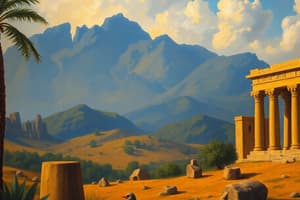Podcast
Questions and Answers
The Indus Valley Civilization existed from approximately 2600 to 1900 BCE, with urban centers like Harappa and Mohenjo-Daro showcasing advanced ______ techniques.
The Indus Valley Civilization existed from approximately 2600 to 1900 BCE, with urban centers like Harappa and Mohenjo-Daro showcasing advanced ______ techniques.
urban planning
Classical Greece emerged around 800 BCE, characterized by city-states ruled by an ______ but later evolving into more democratic forms of government under Athens' leadership.
Classical Greece emerged around 800 BCE, characterized by city-states ruled by an ______ but later evolving into more democratic forms of government under Athens' leadership.
aristocracy
Philosophical schools like Stoicism and Epicureanism originated in Classical Greece, shaping Western thought ______ since.
Philosophical schools like Stoicism and Epicureanism originated in Classical Greece, shaping Western thought ______ since.
ever since
Rome, founded in 753 BCE, rose to become one of the most influential powers in world history, leaving behind vast architectural marvels like the Colosseum and ______.
Rome, founded in 753 BCE, rose to become one of the most influential powers in world history, leaving behind vast architectural marvels like the Colosseum and ______.
Each ancient civilization contributes unique insights into how humans interacted with each other, built societies, perceived divinity, and navigated power dynamics thousands of years ______.
Each ancient civilization contributes unique insights into how humans interacted with each other, built societies, perceived divinity, and navigated power dynamics thousands of years ______.
Flashcards are hidden until you start studying
Study Notes
History
The study of history involves exploring past events and understanding their impact on present-day society. It encompasses various aspects such as politics, economics, social structures, culture, religion, and warfare, providing insights into how human societies have evolved over time. Herein lies a brief exploration of ancient civilizations that marked significant milestones in our chronicle.
Ancient Civilizations
Mesopotamia
Mesopotamia is often considered one of the cradles of civilization, with its roots dating back to at least 3500 BCE. Its people developed advanced writing systems like cuneiform and created legal codes such as Hammurabi's Code that continue to influence modern law. The region was also home to powerful empires like Babylonia and Assyria, which contributed significantly to history through their military achievements and cultural legacies like ziggurats and mythologies like Enuma Elish.
Ancient Egypt
Ancient Egypt boasts one of the longest continuous histories, stretching from around 3100 BCE to 332 BCE when it became part of the Greek Empire. This civilization, known for its monumental architecture like pyramids and temples, developed complex religious beliefs centered on gods and pharaohs who were often considered divine rulers. Their hieroglyphic script remains an enduring symbol of ancient Egyptian culture.
Indus Valley Civilization
The Indus Valley Civilization existed from approximately 2600 to 1900 BCE, with urban centers like Harappa and Mohenjo-Daro showcasing advanced urban planning techniques. Though less well-known than other civilizations due to lack of written records, this society had sophisticated sanitation systems and trade networks extending across Central Asia.
Classical Greece & Rome
Classical Greece emerged around 800 BCE, characterized by city-states ruled by an aristocracy but later evolving into more democratic forms of government under Athens' leadership. Philosophical schools like Stoicism and Epicureanism originated here, shaping Western thought ever since. As for Rome, founded in 753 BCE, it rose to become one of the most influential powers in world history, leaving behind vast architectural marvels like the Colosseum and aqueducts.
These are just a few examples among many ancient civilizations that shaped our understanding of humanity's past. Each contributes unique insights into how humans interacted with each other, built societies, perceived divinity, and navigated power dynamics thousands of years ago.
Studying That Suits You
Use AI to generate personalized quizzes and flashcards to suit your learning preferences.




